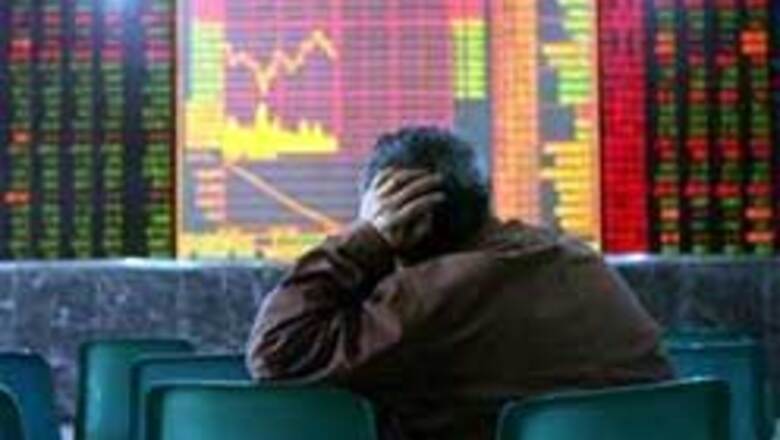
views
There have been enough newspaper reports about how inflation eats into your portfolio.
So, I decided to review a real portfolio and what inflation has done to it.
Vijay Pandey (name changed to protect identity), a 43-year old professional has been saving aggressively since early 2006. He lives in Mumbai and has two main financial goals: a good education for his seven-year daughter and a healthy corpus for his own retirement.
He also wants to travel, within India and abroad, whenever possible. Lucky for Vijay, his wife is a homemaker who takes a keen interest in investing and managing money.
Since 2006, Vijay has invested a capital of around Rs 30 lakh (Rs 3,000,000). Here's a glimpse of his portfolio.
In early 2006
Returns (Rs)
Equity direct
400,000
15%
60,000
Equity Mutual fund
1,000,000
15%
150,000
Fixed deposits
300,000
5.36%
16,080
Provident Fund
250,000
8%
20,000
Post office MIS
300,000
5.36%
16,080
RBI Bonds
200,000
5.36%
10,720
Cash/Savings A/C
2.01%
11,055
Rs 17,190
TOTAL
3,000,000
283,935
% Returns on overall portfolio = 9.46%
Returns (Rs)
Equity direct
200,000
15%
30,000
Equity Mutual fund
620,000
15%
93,000
Fixed deposits
300,000
5.36%
16,080
Provident Fund
250,000
8%
20,000
Post office MIS
300,000
5.36%
16,080
RBI Bonds
200,000
5.36%
10,720
Cash/Savings A/C
2.01%
11,055
Rs 17,190
TOTAL
2,420,000
196,935
% Returns on overall portfolio = 8.14%
Vijay's overall loss: 1.33 per cent
PAGE_BREAK
The equity power concept
It's obvious that the loss is due to the fall in equity markets. The value of Vijay's equity investments have dropped from Rs 14 lakh (Rs 1,400,000) to Rs 8.2 lakh (Rs 820,000).
Tempted to argue that in absolute numbers Vijay is okay and that his well-diversified portfolio has helped him hedge the equity market crash and that overall loss looks like a dismal 1.33 per cent?
However, returns on your portfolio and inflation are inversely related. So, if inflation rises, returns will fall irrespective of what composition of debt and equity you have.
So, if inflation is say 11 per cent:
Real returns on equity investments = 15-11 = 4 per cent approximately
Real returns on debt investments = 8-11 = - 3 per cent approximately (you are losing money here)
If you apply this formulae to real returns on Vijay's portfolio, his debt investments look healthy only on paper. In the real world, they are worth a pittance. Here's why.
Do the math
Real returns on portfolio in early 2006 when inflation was at 7 per cent:
9.46-7 = 2.46 per cent
Real returns on portfolio today when inflation is at 11 per cent:
8.14-11 = - 2.86 per cent
Here's the killer!
Over the last two and half years, Vijay's portfolio has not only lost a profit of 2.46 per cent but it has further lost 2.86 per cent. That means, a total of 5.33 per cent of his portfolio value has been wiped out.
Another way of looking at it: in addition to the loss of 1.33 per cent, Vijay has lost another 4 per cent (increase in inflation from 7 per cent to 11 per cent) only on account of inflation. Converting this in numbers, 4 per cent of 30 lakh (Rs 3,000,000) ie Rs 1.2 lakh (Rs 120,000) is the erosion in purchasing power of money.
Thus, though the portfolio appears to be worth Rs 24.2 lakh (Rs 2,420,000) in absolute money terms, in terms of real value of money it is worth just Rs 23 lakh (Rs 2,300,000). A total erosion of Rs 7 lakh (Rs 700,000)!
PAGE_BREAK
Smart advice
1. Protect your money.
The natural thing to do is to move it into higher return generating areas, in this case, equity. The objective is to make the 8.14 per cent reach at least the 9.46 per cent threshold that we started out with.
By moving into assets that have a higher return generating capability we improve the odds of protecting the erosion of our money. Consider moving FD money into equities.
2. Next, compensate yourself.
So, if there a chance to add more, do it slowly and steadily. Consider moving cash into equities leaving just about what you need. Holding Rs 5 lakh (Rs 500,000) in a bank account is a colossal waste of hard-earned money.
Besides we've always heard that it's a good idea to buy equities when markets fall. This could one of the reasons most experts tell us not to panic, to hold and add more to equities.
Disclaimer: The concept 'power planning' and contents above, are the intellectual property and copyright of the author, Kartik Jhaveri. No part may be used or reproduced in any form or manner. If you choose to act upon the information contained in the above article it is at your own risk. This article is purely educative and you are strongly advised to consult an expert prior to taking any significant decision.
**Portfolio returns calculated by assuming 15 per cent return on equities, 8 per cent return on non-equities, 3 per cent returns on cash and taxes at the rate of 33 per cent for fixed deposits, POMIS, RBI Bonds and cash.




















Comments
0 comment